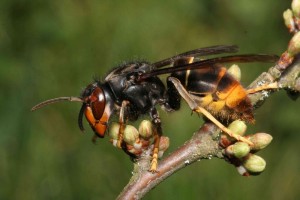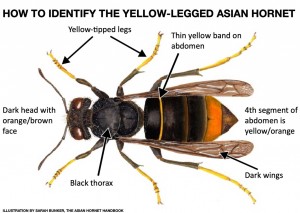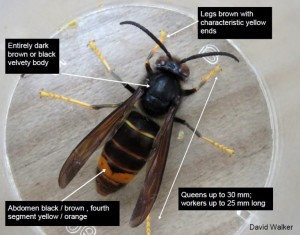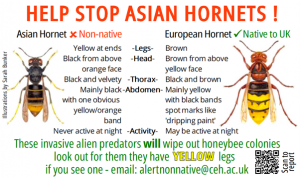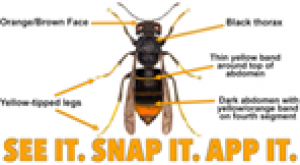South Yorkshire, United Kingdom Aug 30, 2024 (Issuewire.com) - As Asian Hornet Week approaches, the Barnsley Beekeepers’ Association is calling on the public to stay vigilant and help protect our local wildlife by correctly identifying and reporting sightings of the Asian hornet (Vespa velutina). This invasive species, first detected in the UK in 2016, poses a significant threat to honey bee populations and other pollinators, as well as to biodiversity across the country.
This year’s Asian Hornet Week, running from 2nd to 8th September focuses on raising awareness about the differences between the Asian hornet and our native European hornet (Vespa crabro). Correct identification is crucial, as the European hornet plays a valuable role in our ecosystem and should not be mistaken for its destructive cousin.
Ivor Flatman, Barnsley Beekeepers’ Asian Hornet Coordinator, highlighted the importance of public involvement in this nationwide effort:
"With the number of confirmed Asian hornet nests on the rise, it is more important than ever that we all know what to look for. The impact of this invasive species cannot be understated—they pose a serious risk to our native bees and beneficial insects, which are essential for pollination and biodiversity. We’re asking everyone in Barnsley and beyond to be our eyes on the ground. If you think you’ve spotted an Asian hornet, report it immediately through the Asian Hornet Watch app. Your vigilance could make a huge difference in protecting our local environment."
As of 2nd August 2024, there have been 26 Asian hornet sightings in the UK this year, with 22 confirmed specimens and two nests destroyed. Most sightings have occurred in Kent and East Sussex, but given the insect’s ability to spread rapidly, the risk is real and growing across the country, including in Yorkshire. Last year, Asian hornet sightings were reported in North and East Yorkshire, a concerning development for South Yorkshire apiarists and entomologists.
The National Bee Unit (NBU) has been working tirelessly alongside members of the British Beekeepers’ Association (BBKA) to track and manage the spread of Asian hornets. In June, genetic analysis confirmed that hornets found in East Sussex and Kent were offspring of nests destroyed in 2023, underscoring the importance of early detection and rapid response to prevent further spread.
During Asian Hornet Week, the Barnsley Beekeepers’ Association will be providing resources and guidance on how to distinguish between the Asian and European hornets: why not visit our stand at the Penistone Show? The Asian hornet is slightly smaller than the European hornet, with distinct black colouring, an orange face, a thin yellow band near the middle, and bright yellow legs. In contrast, the European hornet is larger and has a more reddish-brown appearance.
The public is encouraged to download the Asian Hornet Watch app, available for both Android and iPhone, to report any suspected sightings. Photos can be uploaded through the app to help experts identify the insect and, if necessary, locate and destroy nests.
As the holiday season continues, Barnsley Beekeepers’ Association also asks those travelling around the country to be especially mindful. Whether in rural areas or urban environments, the possibility of encountering an Asian hornet nest is real, and early reporting is crucial.
For further information, updates, and resources, please visit the Barnsley Beekeepers’ Association website at www.barnsleybeekeepers.org.uk.
Media Contact
Barnsley Beekeepers Association chair@barnsleybeekeepers.org.uk http://www.barnsleybeekeepers.org.uk
